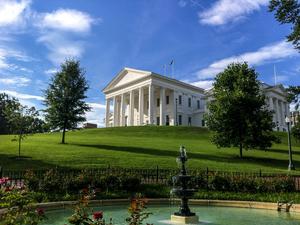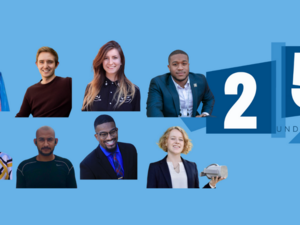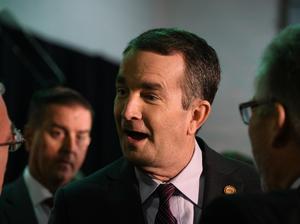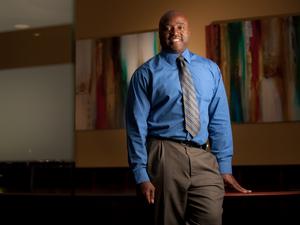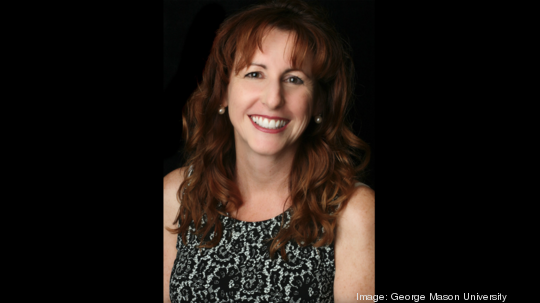
The first business Paula Sorrell launched was inside her undergraduate dorm at Central Michigan University. She employed a few fellow students to help turn handwritten reports into typed papers for athletes, broadcasting majors and anyone else in need of such services. Correcting spelling errors and grammatical mistakes was extra.
It was, in a way, a sign of things to come. Sorrell would go on to help launch a number of businesses in Michigan as the head of a number of multimillion-dollar entrepreneurship programs in both the public and academic sectors.
In May, Sorrell started her new role as associate vice president of innovation and economic development at George Mason University. She'll be charged with, among other things, developing entrepreneurial programming for the Arlington campus and across the rest of the university. And she pointed to that first endeavor at CMU — a chance to get beer money for some of her staffers, but a way for Sorrell to help pay her way through college — as an example of her longtime focus on connecting talent to those in need of it.
“I can’t stop doing startups,” Sorrell said in a recent interview with the Washington Business Journal. “I came to Mason because I like the way it thinks about economic development. And there is a lot of opportunity to build with everything that is going on.”
Vision for the Arlington campus
She arrives as George Mason University is developing a 460,000-square-foot building at its Virginia Square campus in response to Amazon.com Inc. naming Arlington the home of its second headquarters. Given that, she said she expects many opportunities to pair GMU's research with tech companies looking to locate near the e-commerce giant — or to spin it off into its own businesses. Her ultimate mission: to get products into the market more efficiently.
“There is this perception that federal funding gets poured into the top of a funnel at a university setting, and in the middle of that funnel, magic happens. And companies and technology pop out of the bottom,” she said. “But this is actually a very hard and complicated thing to do.”
Sorrell can tell you just how complicated it is. Before she moved to Northern Virginia, she was director of the Economic Growth Institute at the University of Michigan for three years. During that time, she said the team brought a little more than 200 new technologies to the market.
At GMU, part of Sorrell’s job will be figuring out best uses for some of the new Arlington space, whose future architect has been narrowed to three firms. The broad strokes of the building — set to complete in 2024 — will include 225,000 square feet of academic space and 135,000 square feet of private office and retail. It is expected to house the university's new School of Computing, part of its commitment to produce thousands of more computer science graduates in the next 20 years.
Sorrell said the university wants people walking by to be able to see a demonstration of new technology inside and “feel like they want to be part of it.” Or they might hear a panel on angel investing or learn about a training event.
“I don't want to give the impression that this is going to be very structured because entrepreneurship at its best is organized chaos,” she said. “One person shouldn't try to control it.”
On Virginia Tech’s own innovation campus
Of course, GMU’s Amazon-inspired development is somewhat overshadowed by the $1 billion Virginia Tech Innovation Campus being advanced in Potomac Yard. But Sorrell doesn’t see the two as rivals.
“We have to be able to partner with them,” she said.
Before she worked at the University of Michigan, she was vice president of entrepreneurship, innovation and venture capital at the Michigan Economic Development Corp. There, Sorrell said she established programs to get all of the public universities working together. They set up a corporate engagement center so the schools could improve their ability to license technologies to companies.
Regionwide university collaboration is especially useful in attracting venture capitalists from Silicon Valley or Boston, she said. Sorrell said she envisions more partnerships between GMU and other local higher education institutions in the coming years.
“One university can try to attract sets of funders. But if there are multiples, with more deal flow, it's much easier to pull that funding into a region,” she said.
A new role during a pandemic
When she sought the job in January, she laid out a plan that included meeting Greater Washington's economic development leaders within the first month.
“Obviously, that had to change,” she said.
Nevertheless, Sorrell is determined to make an immediate mark on the local business community. She has had a few socially distant coffees, and she’s holding as many as nine Zoom calls a day. She’s a commissioner on the Fairfax City Economic Development Authority and was asked to join Gov. Ralph Northam’s newly created Virginia Innovation Partnership Authority, which will distribute funds for technology commercialization.
Within George Mason University, Sorrell has joined the Anti-Racism and Inclusive Excellence Task Force.
“I have particular interest in this,” she said, pointing to her past work in Michigan. “We put some effort in helping women entrepreneurs who seemed only to be able to get funding from other women. I don't want that to be the case. I would like to see women and people of color who start businesses to be able to finance them.”

